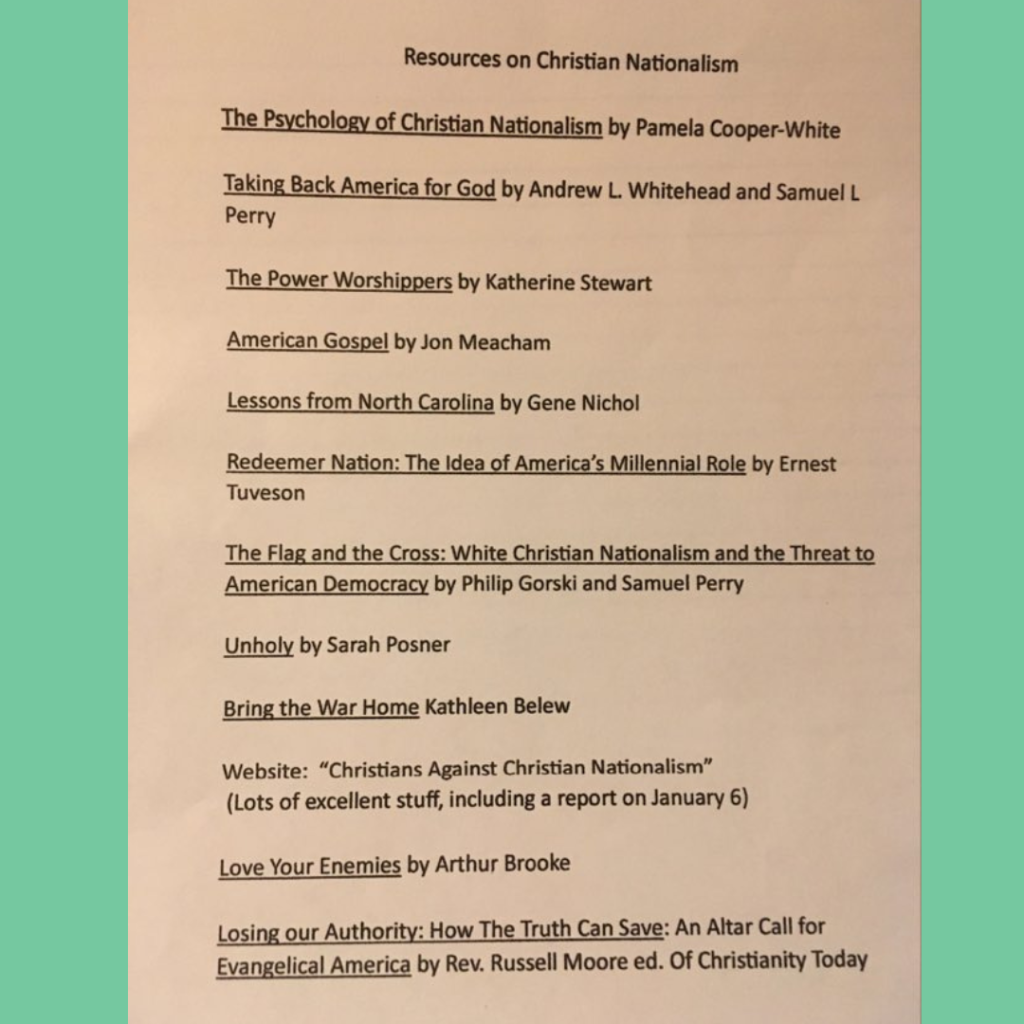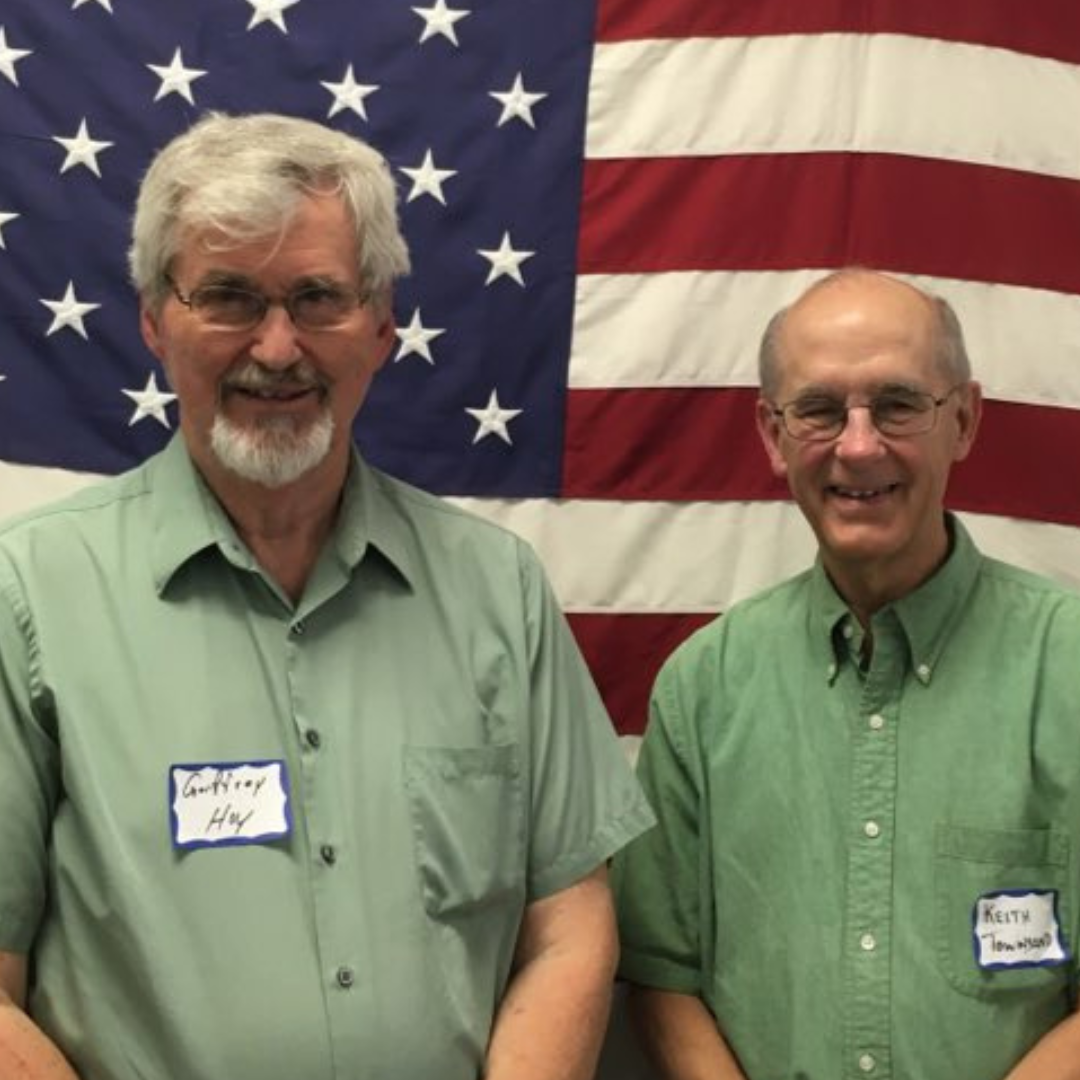Geoffrey Hoy, left, and Keith Townsend, right, presented a Christian and historical perspective about today’s political Christian nationalism, pointing out that the leaders of this movement, both political and religious, are power seekers.
Rowan Senior Democrats and supporters met Tuesday, August 15 for a serious presentation about Christian Nationalism today. The talk focused on the roots of the movement and the motivation of its followers. Christian Nationalism was described as a cultural and political movement. It starts with patriotism, love of one’s country, and moves beyond that to nationalism – the idea that loyalty to one’s country should stand above all else. The presenters contrasted Christian: following the teachings of Jesus—Love, hope, healing, reaching out to the “Other”, to what some Christian Nationalists practice—White supremacy, male superiority, fear of “Others”, America as God’s “chosen nation”, authoritarian government and violence as an acceptable political tactic.
Sincere Christians, both speakers drew from their religious beliefs as followers of Jesus and also from a historical perspective in the United States. Keith Townsend, an Elder and Sunday School teacher at Thyatira Presbyterian is also a retired high school history teacher with an enduring interest in American history and politics. Retired ELCA Lutheran pastor and active leader at St. John’s Lutheran Church, Geoffrey Hoy, focused on his faith affiliation rather than his community role as chair of the Rowan County Democratic Party.
Hoy and Townsend pointed out that the leaders of this movement, both political and religious, are power seekers. Many followers, seeking certainty in a changing world, may not even be aware that their patriotism and faith are being used by the leaders for their own gain.
Like many favorite history professors, Townsend engaged the audience with some little known facts from American history and what would be some mythbusters for some Christian nationalists regarding the founding fathers and their view of the United States as a “Christian nation.” Townsend also included some local and state history from April 1, 2013 that mirrors today’s Christian nationalist ideologies. Ten years ago, state representatives Harry Warren and Carl Ford drafted House Joint Resolution 494 that, as written, could have actually allowed the state of NC to establish an official religion and ignore the US Constitution. Their proposed legislation was so shocking that it quickly made national news. Townsend read excerpts from their proposed bill and the audience readily understood why at the time some thought it was an April Fool’s joke rather than a serious attempt to circumvent religious freedom. “SECTION 1. The NC General Assembly asserts that the Constitution of the USA does not prohibit states or their subsidiaries from making laws respecting an establishment of religion and SECTION 2. The NC General Assembly does not recognize federal court rulings which prohibit and otherwise regulate the State of NC, its public schools, or any political subdivisions of the State from making laws respecting an establishment of religion.” Thankfully, Townsend noted, by April 4th the bill was killed by the House Speaker.
Hoy also urged that Christians and all citizens should engage in dialogue across differences. This active listening and seeking understanding would not be misconstrued as agreement or submission. Hoy urged coalition building out of self interest and seeking common goals. Later discussion centered on the use of fear to divide us as people and the concern that we not let old habits come back to sabotage our future.
The meeting closed with a serious question about what can Christians and others do to maintain our system of government that does not place one religion above another. Hoy and Townsend provided additional information, including a statement available for anyone to sign, Christians Against Christian Nationalism. This group believes that “Christian nationalism threatens our faith and country” and states that “we must stand up to and speak out against Christian nationalism, especially when it inspires actions of violence and intimidation – including vandalism, bomb threats, arson, hate crimes, and attacks on houses of worship – against religious communities at home and abroad.” https://www.christiansagainstchristiannationalism.org/


